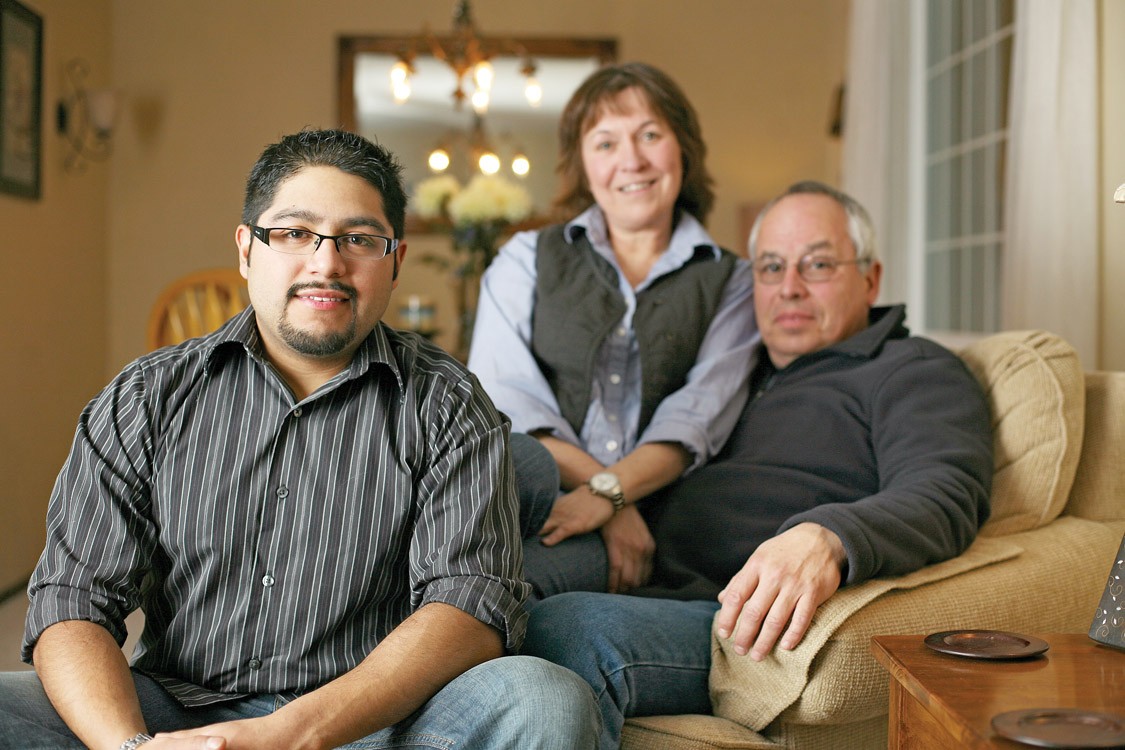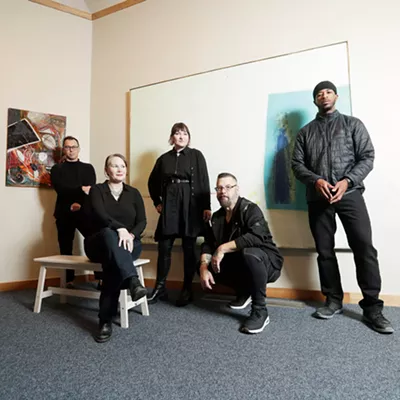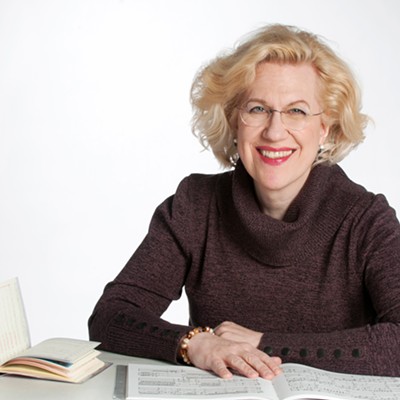On the night it happens, the air hangs heavy with a thick mist in mid-freeze that strikes our skin like needles.
VIDEO
Shane Baumgarten on growing up white in a brown body
This yearlong series will explore how far we have come and how far we have yet to go in achieving a community that is not simply fair and just, but understanding, open and equal.
If you have tips or story ideas, or just want to offer feedback, write [email protected] or call 509-0634 ext. 234.
My brother, Shane, and I are walking home from a night spent downtown at the rock bar Mootsy’s. We are drunk but, as we both remember it, happy.
Two white kids — one tall and chubby, one short and skinny — approach us, asking for cigarettes. They are dressed, to Shane’s recollection, “a little gangster,” wearing baggy denim, oversized white T-shirts, brightly colored goose-down parkas.
Shane, then 22, tells them he doesn’t have any. They ask again. Again, Shane says, “Nope.”
“Come on, homey.” The tall kid is doing the talking.
They are nearly on top of us now.
“I said I don’t smoke,” Shane says, but because Shane and I have been drinking, and because he has gotten aggravated, it doesn’t end there. Shane’s sentence concludes with: “you little bitch.”
The talker immediately wheels on Shane, the flat of his hands hitting my brother in the chest. The tall one says, “Who you calling a little bitch?” or something like that.
The shorter kid steps to meet me while Shane and the taller kid go back and forth, the kid verbally on the offensive.
Shane doesn’t back down. He has a quick wit and, without apologizing to the kid, he begins to disarm him with jokes. Finally, my brother says: “It’s OK to admit — you wish you were a brown man.”
The kid stops and laughs. “Yeah, I got love for you.”
“You got love for the brown man?”
“It’s all love, homey.”
“You wanna hug it out?” Shane asks.
They hug it out. But it isn’t over. Not for Shane anyway. He shoots away, practically at a jog. He’s mumbling to himself, nearly raving. I ask what was going on, but he won’t say.
I keep asking.
Finally, he screams — at the top of his lungs, straight into the sky — “I f---ing hate white people!”
I ask him what he means. Through grit teeth, he says that nobody gets it.
Words begin tumbling out of his mouth. He talks about how he doesn’t feel that our parents respect his adulthood. He says our mom treats him like a child. He lists a dozen things, every frustration and slight he can think of.
Most of these things don’t have to do with race. They are mostly about disrespect. And about failure, which, for Shane, has everything to do with race.
“When I go into a Mexican restaurant and the waiter starts speaking Spanish to me,” Shane says, “I just have to be like, ‘Sorry buddy.’”
That night walking home in January 2008, Shane talks about wanting a family. He talks about wanting a house. He talks about wanting his life settled. These are all failures of his life.
At the end of the walk, Shane stops in the middle of Adams Street and starts to cry. It is a convulsive sort of crying. He tries to bite it back, and it shakes his whole body.
The real problem, he says, finally, “is that I’m a white man in a brown man’s body.”
Our parents weep telling the story. They absolutely bawl.
“All I ever wanted was kids,” our mom, Theresa Baumgarten, says, her voice quavering. Two weeks before their wedding, though, our mom was diagnosed with stage-three cervical cancer. She was 20. “I told your dad, ‘You may not want to marry me.’”
When she cries, our mother’s chin crinkles and she fixes her gaze on mine. Our father, Dennis, squints his eyes, pushing tears out, and he looks away.
The cancer diagnosis was false, but it did foreshadow problems that crippled their chances of having kids. The first time our parents got pregnant, our mom miscarried. Four more miscarriages followed, as did tubal ligations, partial hysterectomies, corrective surgeries, talk of fertility treatments, tears.
In a way, though, this time of heartbreak fit our father’s sense of how his life would proceed. A deeply spiritual man, Dad says he had known since he was young that he would adopt, “just knew it in my heart.”
Dad had a model for what this family might look like.
During the Depression, his father, Rosare Baumgarten — a man neither Shane nor I ever met — took in and supported 17 relatives. “All his nieces and nephews,” our father says, “Donny, Rita, Doug, Eugene — Doug always tells me, ‘We don’t know where we’d be without your father.”
Our dad was born almost two decades later, and even then, his dad would take people in. Homeless people would come to the door begging, and Rosare would set them at the dinner table alongside the family.
The lesson for our father was this: Family doesn’t have to share blood, and it certainly doesn’t have to share culture. Family is whomever you choose to share your life with.
Our mom didn’t have any qualms about adoption, either. “I just wanted to love a child,” she says. The miscarriages were a trial that galvanized their marriage. “We were unable — to have them naturally,” our dad says, “so we thought, ‘We’re gonna get them any way we can.’”
“Any way we can,” Mom agrees.
They look at each other and start crying again.
They adopted me on Feb. 3, 1981 in Spokane, when I was two weeks old. Exactly five years later — Feb. 3 again — in a hotel in Mexico City, our dad was handed Shane. Because of serendipities like this, our parents feel as though our family was fated. A gift from God to two good and faithful servants.
Their reasons for adopting Shane from Mexico were pragmatic. We were a poor family, and I was growing fast. They had heard adoptions from Mexico were cheaper and had less red tape. This would be the quickest way to a younger brother.
It still took three years and $15,000 dollars — over half our family’s yearly income at the time — for Shane to arrive in Spokane. A family friend told the media our story, and KXLY 4 showed up at the airport to cover the homecoming.
Our
parents say they had no expectations about adopting from a different
country. “I expected a kid,” our dad says. “A kid that needed to be
loved,” our mom adds. They didn’t have any fears or apprehensions about
raising a child of color, our dad says. “I just hoped he enjoyed being
with us.”
My parents believe that if you love someone as much as you possibly can, and treat everyone as equitably as possible, things will work out all right.
They didn’t spend much time talking about Shane’s Mexican heritage, because they didn’t know much about it — the same way our mom doesn’t spend much time talking about her Norwegian heritage. There’s nothing there to say.
They put Shane together with a young Mexican girl — same age, also adopted to white parents — in the hope that they would strike up a friendship, but it didn’t take. “She was a girly girl,” Shane says, and he was into building forts. Still, Shane recognizes, “That was [Mom’s] way of preparing me.”
The family never even really talked about the fact that our father, Dennis, is half-Mexican.
His mother, Josephine Vargas, was the daughter of immigrants who had settled in Anaheim, Calif. In important ways, Shane’s story begins with her.
The Vargas family was cripplingly poor. The family would sometimes live on a small sack of beans a week. “The dresses she wore were made of flour sacks,” our dad says. When she was young, the family migrated north, to Stockton, and worked the fields. Josephine eventually put herself through high school.
Our grandmother Jo’s childhood shaped her view of her culture and shaped the way she raised her children. For her, English was a language of prosperity. “She said, ‘You speak English, this is America,” Dennis recalls. “If you want to speak Spanish, you can take a class.’”
Later, as Josephine’s children grew, Spanish became a language of violence. Their neighborhood in Stockton was filled with gang activity. The Mexican gangs mostly spoke Spanish. By keeping her kids monolingual, my dad thinks, his mother was trying to keep them alive.
But there was a bit of shame, too. Dad has a faint memory of a conversation he overheard in childhood, someone talking to Josephine about her Mexicanness and her replying, “Oh no, no, no, I’m white.” Looking back, Dad says, “I think she wanted to think she was more white than she was Mexican.”
Neither parent, our dad says, ever spoke with him about their past or the culture they came from or much at all about his heritage. They didn’t express any pride or spite. They both considered themselves — to their kids, anyhow — completely American and nothing more.
For his father, Rosare, America was a big tent. He believed in equality, going to see Martin Luther King Jr. when he came to California. Our dad remembers the lessons Rosare taught him — that we are all people in the eyes of God, and that race, like eye color, shouldn’t matter.
Our mom had a similar experience. Her father, Duane Renz, was in the Air Force, and the family spent its time “behind gates” on bases in Washington state and California. These bases were very diverse. Our mother spends a minute rattling off her childhood friends — many of whom were black and Latina girls.
It gave our mom a sense of color-blindness to go along with our father’s. When she thought of these young women, she didn’t see color. “They were just girls,” she says. “They were my friends.”
Shane,
though, wasn’t raised in our mother’s world, or in the world of our
father’s childhood. He says our parents’ love wasn’t enough to prepare
him for the world he found.
In 2000, Hispanic people made up about 3 percent of Spokane County’s population. In the northern part of the county, though, above Mead, that number drops. Riverside School District had only 120 Hispanic people — barely 1 percent — when Shane was a freshman at Riverside High.
It is an overwhelmingly white place, but it wasn’t overt racism that Shane first noticed.
First was the way people looked at our family in grocery stores. “We’re all just a little different,” he tells me. “You and Mom are white, Dad’s kinda white, and then there’s me.”
Things became more plain and troubling during college at Eastern. His best friends had all gone to school in different places. Without that support system to insulate him, and in the middle of “trying to figure out who I wanted to be,” he became acutely aware of the way people viewed him. And not just white people.
A college girlfriend (white) convinced him to attend a get-together put on by the Chicano Studies program at Eastern Washington. He says he felt every bit as out of place there as among white people. “I go there and everybody is all cliqued together and, you know, speaking Spanish,” he says, “and I think, ‘Well, this is just f---in’ awkward.’”
He left after 15 minutes, feeling as though he didn’t pass in either culture, and feeling, more than anything, like “I’m being asked [to represent] a culture that doesn’t represent me.”
It wasn’t conscious, but this period changed the way Shane and I behave toward each other, too.
The older we get, the more Shane and I find ourselves explaining ourselves. The older we get, the more people’s double take to learning we’re brothers has changed the way we tell our own story.
He is dark and short and built like a power lifter. I am tall and thin and so white I sometimes look blue. We understand that this is strange for people.
Our story is not a common one, and for whatever reason — be it Shane’s discomfort or my own — we have begun to prepare people. Before we even appear in the same place, we offer introductory details. The differences in our height. His ability to tan. My envy at this fact. Sometimes I say, “Shane was adopted from Mexico,” then, as a way to let people know that he’s not the only weird one, I say, “I was adopted, too.”
Shane makes cracks about his color. He calls himself “the brown man” — as though he were the only one. In most cases, he is.
Shane says he does it as a way of letting people off the hook, and then he admits it is also a way of controlling the situation. Shane loves to win — or, more precisely, “I just hate failing” — and he sees this as a way of jumping out to an early lead. “That shit is going to happen anyway,” he says.
Shane says he can sense people’s cognitive dissonance when he speaks to someone on the phone and then meets them in person. Their eyes, Shane says, betray a reaction like, “Your voice sounds like that, but your skin looks like this?”
But cognitive dissonance is not racism. Shane realizes this. In most ways, he says, people are good to him. They give him respect. They treat him with dignity. Shane carries himself that way, too. He is kind and generous and funny. He’s a successful union steam fitter. He isn’t hard to like. He is certainly easy to respect.
In situations where respect is not offered to Shane, though, he works hard to earn it. When he cannot earn it, he makes sure to take it. Sometimes he goes overboard — taking offense where none was given — like that night with the cigarette-bumming white kids.
Shane believes the reason he is so in tune with disrespect — so sensitive to it — is because of the color of his skin. And so, in an important way, all conflict in Shane’s life is a racial conflict, because all conflict reminds him of his otherness.
He says he feels an otherness with his best friend, Matt Kummer, a cattle farmer who is thick and strong and has hair so blonde it is nearly translucent.
Shane feels this otherness with our mother, Theresa. Even though Shane says he can tell her anything — and that she has an uncanny way of extracting things — he has never told her he feels this otherness.
He feels an otherness even with our father, Dennis, though the man is half-Mexican. He was the first Baumgarten Shane ever saw, and Shane thinks the two share something that is unlike anything Shane shares with anyone else. Despite this, Shane says he’s never had a real conversation with Dad. Certainly not a conversation about race.
This estrangement, “it’s just … aggravating,” Shane says, and he means that in both senses of the word. It is an irritant that stops him from ever feeling completely comfortable — even at home, even with extended family — and it is an exacerbating factor that shapes his more explosive tendencies into actions that, at times, can be dangerous and destructive.
People
aggravate Shane because, he believes, they possess innately something
he worries he will never find — the calm that comes from being perceived
by the world the way you perceive yourself.
Shane took a summer job in 2005, working in childcare at a camp outside of Santa Cruz, Calif. Our mom remembers him saying, “When I walk into a coffee shop [in Spokane], everybody turns and looks. When I walk into a coffee shop in California, I just blend in.”
Later, he would go spend time with some friends in New York. Most of them were Asian. He said he felt at peace with them. “It’s almost like they don’t see me as brown,” he says. “They just see me.”
It was easy to talk with them, he says, it was comfortable. They never talked about race, but he knew that they understood. “I could just tell that they deal with the same shit, and they understand it,” Shane says.
Santa Cruz, like Spokane, he says, “was a predominantly white area, but having Mexicans is the norm down there.” After that experience, he understood the part of personhood he had been missing, he says.
Until
then he had never felt like “the norm” anywhere before. His great
struggle, I believe — from years of watching him succeed in life while
always falling short of personal satisfaction — is that he’s never been
able to find it anywhere since.
It has taken us four years to talk about that night in the freezing mist. It was four years of worried silence for me and — the way he tells it — four years of barely contained aggravation for him. We didn’t talk about it, because we’ve never talked about it.
We didn’t talk about it, because our parents never talked about it. They didn’t talk about it, because their parents hadn’t either and because they didn’t realize it was a problem.
We are only talking about it now because Shane agreed to let me write this story. He says he believes it is important for him to keep talking. “I need to talk with Dad, with Mom, with Matt, with you,” he says. Telling me this story was a good start, but it’s only a start.
Our parent’s lack of recognition, Shane says — and the silence that came with it — made his feelings of alienation worse. And even if his loved ones didn’t see him as being different, he wishes we could have acknowledged that other people view him that way.
Shane says he doesn’t blame our parents for not knowing to ask questions. They’ve never had to deal with this in their own lives, he says. “They just weren’t equipped with that skill.”
He wants to find a way to tell our dad how he feels about him. He wants to hear the love returned, in words, too. He still feels, in many ways, like the 10-month-old who reached out to Dennis Baumgarten the first time he laid eyes on him. “I want to connect with him on that level,” Shane says. “I know the love is there but the ability to convey it is not.”
He yearns for the type of experience he had with his Asian friends in New York. He wants to have that here, too, and until that happens he says he’s going to try and create a cultural pidgin to help the rest of us understand what it’s like to be him.
A couple weeks ago, at Mootsy’s, he told me he’s looking forward to those discussions.
No matter how deep those conversations go, I know I’ll never really understand what it’s like to feel like a white man in a brown body. I’ll at least learn how to talk with Shane about it.
Shane says the great insight of the last month — the thing that will begin his journey — is which of those perceptions he can change, and which he can’t.
Shane Baumgarten will never be able to make himself look as white as he feels. If he wants to reconcile the inside with the out — to shed that cognitive dissonance — he says he’ll need to embrace the brown.
“I
think the first step for me is actually acknowledging that I’m
Mexican,” he says, smiling a little. “That’s something of an epiphany in
itself.”




















